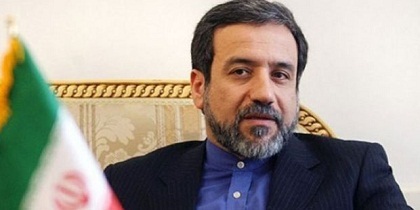Iran Says Direct U.S. Talks Essential for Nuclear Deal
إقرأ هذا الخبر بالعربية
Iran's chief negotiator said Sunday that direct talks agreed between Tehran and Washington are essential, as discussions on his country's disputed nuclear program are entering a "serious phase".
The two countries will hold their first full-scale bilateral talks in decades on Monday and Tuesday, an unprecedented move toward securing a comprehensive nuclear deal between Iran and the West.
Iranian officials will then hold discussions with Russia in Rome on Wednesday and Thursday.
The Iranian foreign ministry said it was "working to arrange" other bilateral meetings with members of the P5+1 group -- Britain, China, France, Russia, the U.S. and Germany -- before the powers meet in Vienna from June 16-20.
The talks are aimed at securing a comprehensive agreement on the Islamic republic's nuclear program, which the west says is aimed at developing weapons, ahead of a July 20 deadline imposed under an interim deal agreed last November.
In return, Iran wants an end to wide-ranging economic sanctions, imposed as punishment for its atomic program and resisting extensive international inspections, that devastated its economy.
"We have always had bilateral discussions with the United States in the margin of the P5+1 group discussions, but since the talks have entered a serious phase, we want to have separate consultations," said Abbas Araqchi, Iran's chief negotiator in comments reported by state news agency IRNA.
"Most of the sanctions were imposed by the U.S. and other countries from the P5+1 group were not involved," he added.
Araqchi said the talks with the U.S. in Geneva will only address the nuclear issue, referring to Iran's ballistic missile program that Washington had hoped to include in negotiations.
A senior U.S. administration official said the talks "will give us a timely opportunity to exchange views in the context of the next P5+ 1 round in Vienna".
The U.S. delegation will be led by Deputy Secretary of State Bill Burns and Jake Sullivan, a White House adviser, previously part of a tiny team whose months of secret talks in Oman brought Iran back to the P5+1 negotiating table last year.
Araqchi welcomed Burns's presence, saying he hoped it would be "as positive during these negotiations".
After decades of hostility, Iran and the U.S. made the first tentative steps towards rapprochement after the election of self-declared moderate Hassan Rouhani as president last June.
Rouhani called his U.S. counterpart Barack Obama shortly after he took office, which was followed by a meeting between Secretary of State John Kerry and Foreign Minister Mohammad Javad Zarif.
I am not sure is the "Islamic Republic" is any better than the other side who support and have given us the likes of Muslim Bros, Al-Qaeda, and the rest of the garbage. These Persians will emerge victorious out of the Syrian conflict and reshape our lives. I hope these Mullahs have lucrative jobs in Iran for our young graduates, create a mutually beneficial business environment in the Middle East, and, most importantly, promote freedom of the kind we in Lebanon are accustomed to.
Oh rascal, you didn't read between the lines. Read it a 2nd time. You didn't see the self contradictions I exposed of from my expectations of the Persians?



